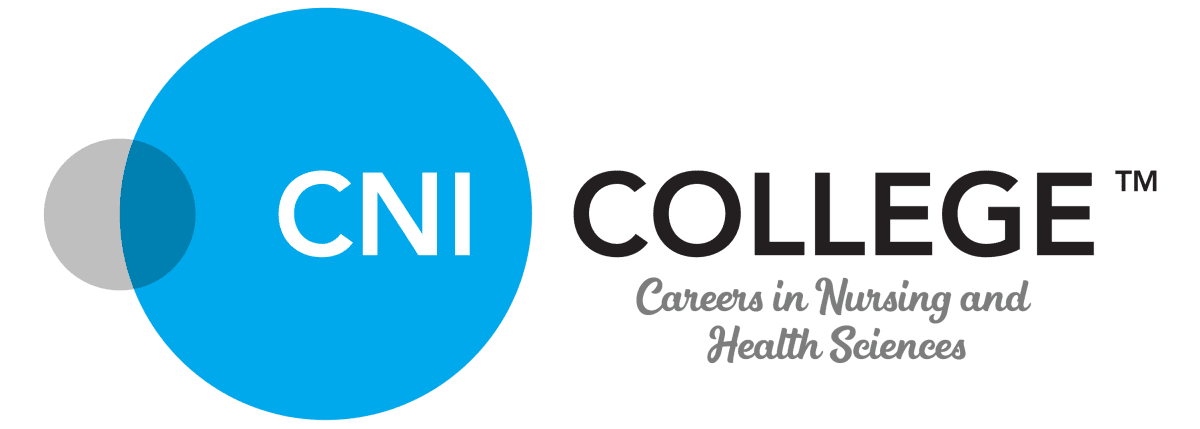BSN Program in California
One-on-one guidance available from day one through graduation.
Page Contents
Bachelor of Science in Nursing (BSN) Program Overview
Become a Registered Nurse (RN)!

Embark on a transformative journey in nursing education with CNI College’s Bachelor of Science in Nursing (BSN) program. Discover a curriculum that seamlessly integrates biological and social sciences, preparing students for client-centered care through critical thinking and evidence-based practice.
Curriculum Integration for Well-Rounded Nursing Professionals
The BSN diploma program at CNI College is designed to cultivate well-rounded nursing professionals through a comprehensive curriculum that blends general education and core nursing courses. This pre-licensure program strategically combines biological and social sciences, fostering graduates capable of administering client-centered care. The curriculum emphasizes critical thinking, holistic clinical reasoning, evidence-based practice, and progressively advances from foundational concepts to an advanced level, preparing students for graduate studies.
Guiding Concepts for Professional Nursing Roles
The BSN curriculum aligns with esteemed nursing organizations, incorporating guiding concepts such as the Nursing Process, Evidence-Based Practice Nursing, Therapeutic Care and Communication, Transformative Teaching and Learning Methodologies, and Interprofessional Collaboration in Healthcare. This alignment reflects compliance with standards set by the American Association of Colleges of Nursing (AACN), Essentials for Baccalaureate Education, Quality and Safety Education for Nursing (QSEN), Accreditation of Distance Learning, Interprofessional Education Collaborative (IPEC), and the California Board of Registered Nursing guidelines.
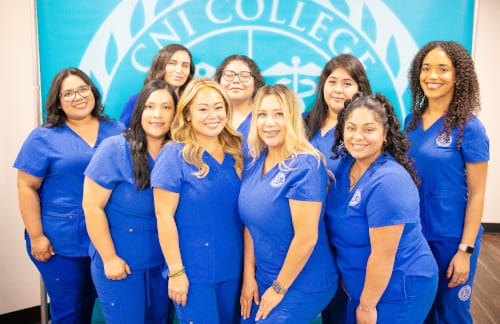
Core Competencies and Organizational Leadership
CNI College strives to provide a high-quality liberal education for baccalaureate students, instilling key competencies in organizational and systems leadership for quality care and patient safety. The curriculum emphasizes scholarship for evidence-based practice, information management, application of patient care technology, healthcare policy, finance, regulatory environments, interprofessional communication, collaboration, clinical prevention, population health, professionalism, professional values, and a strong generalist nursing practice.
Recognition of Excellence: Best of Orange County 2025 Award

In a remarkable achievement, CNI College has been honored with the prestigious “Best of Orange County 2025: Education: Best Career College/Nursing School” award by The Orange County Register newspaper for the 3rd year in a row. This recognition underscores CNI College’s commitment to excellence in nursing education and its significant impact on the Orange County community. The award is a testament to the institution’s dedication to producing highly skilled and compassionate nursing professionals who contribute to delivering quality healthcare services.
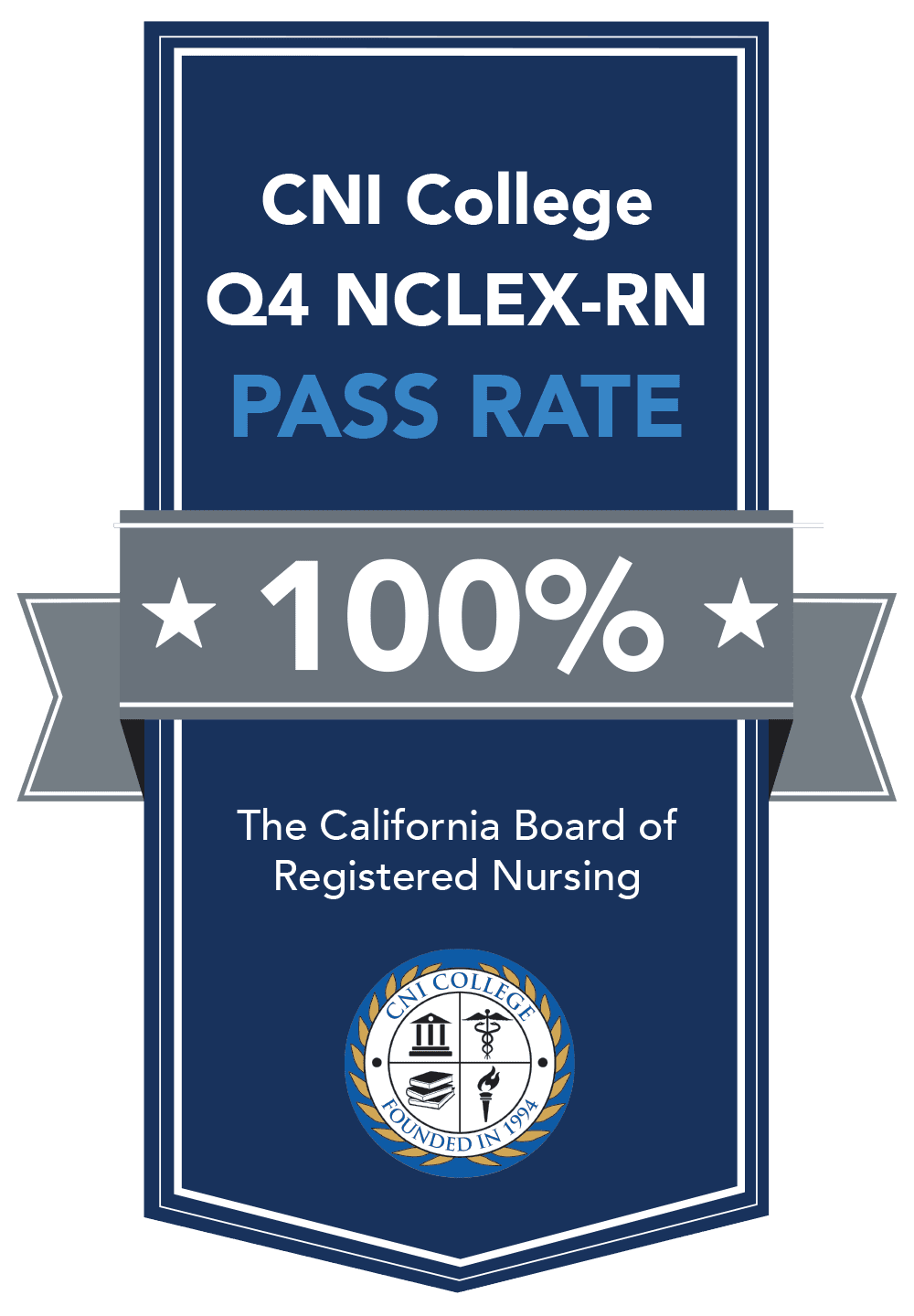
Schedule a Visit to CNI College
If You Are Ready To Get The Education You Need To Start Your Career In The Healthcare Field.
Holistic Approach to Nursing Education
What sets CNI College apart is its holistic approach to nursing education. The institution combines a cutting-edge curriculum with hands-on training, ensuring students are not only academically prepared but also equipped with practical skills crucial for success in the healthcare industry. CNI College fosters a supportive and inclusive learning environment, where students from diverse backgrounds thrive and grow into capable healthcare professionals.
Goals of the BSN Program
The Bachelor of Science in Nursing (BSN) program at CNI College aims to develop knowledgeable, skilled nurses ready to face the complexities of modern healthcare. It emphasizes ethical practice, cultural sensitivity, and evidence-based care, fostering professionals who are both practitioners and leaders. The diploma program produces morally reflective, adaptable lifelong learners, dedicated to improving individual and community health. Graduates are equipped to meaningfully contribute to the health of diverse populations.
BSN Program Duration
The CNI College Bachelor of Science in Nursing (BSN) Program offers a dynamic and flexible learning experience through a blended method of delivery, encompassing residential, hybrid, and distance education formats. All program courses are conducted in English, ensuring clear and effective communication for all students. The full-time program spans 31 months, structured into 13 quarters, each lasting 10 weeks, amounting to a total of 130 weeks. This comprehensive program includes 2740 clock hours and culminates in earning 180.0 quarter credit units. A distinctive feature of our BSN program is the inclusion of clinical practicums, integral to the curriculum and delivered in various healthcare settings, providing students with hands-on experience and practical exposure to real-world nursing challenges.
Turn my Passion Into a Career
All fields required*
BSN Curriculum and Key Courses

The BSN Program at CNI College blends general education with core nursing courses, focusing on biological and social sciences to produce well-rounded nursing professionals. It emphasizes client-centered care, critical thinking, holistic reasoning, decision-making, and evidence-based practice, preparing students for advanced nursing roles and graduate studies. Key curriculum concepts include the nursing process, therapeutic care, transformative teaching, and interprofessional collaboration, aligning with standards from AACN, QSEN, IPEC, and the California Board of Registered Nursing. Courses are offered through the Canvas system, providing centralized access to eBooks, simulations, and lab resources for an integrated educational experience.
Exploring the BSN Courses
The Bachelor of Science in Nursing program at CNI College features a diverse range of courses meticulously designed to cover every facet of nursing education. From foundational knowledge in biological and social sciences to advanced nursing practices, each course is structured to build upon the last, ensuring a comprehensive learning experience. Below is a detailed overview of each course, providing insights into their objectives, content, and how they collectively contribute to shaping proficient and compassionate nursing professionals.
Quarters 1 – 3
This foundational course equips students with study skills and innovative strategies essential for success in the BSN program and lifelong learning. It emphasizes the development of critical thinking and reasoning as a foundation for concept-based learning, covering topics like nursing history, theory, patient-centered care, evidence-based practice, informatics, and ethical considerations. The course includes 90 hours, with 30 theory and 60 lab hours, delivered in a blended/hybrid format.
Focusing on developing proficient written communication skills, this course teaches students the writing process, critical analysis of readings, and writing for various purposes and audiences. It includes composing, organizing, revising, and editing skills, with emphasis on proper spelling, grammar, punctuation, and APA format style writing. The course, comprising 40 theory hours, is delivered online through distance education.
This course enhances verbal and nonverbal communication skills, vital for effective interpersonal relationships and professional interactions in healthcare. It covers strategies for engaging and motivating others, and adapting to change. The course includes 20 theory hours and is delivered online, focusing on skills necessary for interprofessional communication and collaboration.
Offering a comprehensive overview of college algebra, this course covers linear and quadratic functions, polynomial and rational functions, and more. It is foundational for healthcare disciplines, especially in areas like medication dosage calculations and critical thinking in mathematics. The course includes 40 theory hours, delivered online through distance education.
This course introduces students to human anatomy, focusing on organ and systems levels, with interactive lectures and clinical applications in the anatomy lab. Essential for healthcare disciplines, it lays the foundation for health assessments across the lifespan. The course includes 100 hours, with 40 hours of theory and 60 hours of lab, delivered residentially.
Providing a general overview of psychology, this course covers fundamental principles of human behavior, including topics like learning, motivation, perception, and lifespan development. It is essential for understanding patient behaviors and mental health in nursing. The course comprises 40 theory hours, delivered online through distance education.
This course is designed to offer students the skills necessary to interpret and critically evaluate statistics commonly used to describe, predict, and evaluate data in an information driven environment. The focus is on the conceptual understanding of how statistics can be used and how to evaluate statistical data. This course consists of a total of 50 theory hours delivered online through distance education. (Foundation course for healthcare disciplines using statistical calculations and research related processes.)
This course provides the student with an introduction to human physiology. The foundations of physiology are explored utilizing the basic principles of physics, chemistry, cell biology, and biochemistry. The laboratory component of the course emphasizes the concepts presented during the interactive class lecture. This course consists of a total of 100 hours, 40 hours of theory and 60 hours of science lab delivered residentially. (Foundation course for healthcare disciplines requiring progressive health assessments of clients across their lifespan.)
Oral Communication is a survey course designed to introduce the student to the basic concepts and theories in the field of communication. The course combines theoretical approaches with applied activities to provide the student with communication skills that are required in the job market. Active participation in class discussions, group and individual activities, and oral presentations are required for successful completion of this course. This course consists of a total of 40 theory hours delivered online through distance education. (Foundation course for healthcare disciplines requiring interprofessional communication and collaboration.)
This course explores the psychological development of individuals across the lifespan from prenatal development through the end of life. Topics focus on the physical, cognitive, emotional, and social developments that occur in each phase of the lifecycle. The course introduces both classic and current modalities of research and explores the concepts of death, dying, and bereavement. This course consists of a total of 40 theory hours delivered online through distance education.
Quarters 4 – 6
This course provides the student with an overview of microbiology. The foundations of microbiology begin with the relationship of microbes in daily life and continue through the pathologic disease processes. Environmental and industrial applications for microbiology are explored as new areas of development. The laboratory component of the course emphasizes the concepts presented during interactive class lectures. This course consists of a total of 100 hours, 40 hours of theory and 60 hours of science lab delivered residentially. (Foundation course for healthcare disciplines requiring progressive health assessments of clients across the lifespan.)
This introductory course covers the principles of general, organic, and biochemistry, relevant to human health and diseases. Topics include the scientific method, chemical reactions, compounds, and the biochemistry of carbohydrates, proteins, lipids, and nucleic acids. The course, totaling 50 theory hours and delivered online, is foundational for healthcare disciplines focusing on health assessments and disease understanding.
Building upon ENG 100, this course further develops professional writing skills, including research techniques, proper citation, and critical analysis of written topics. It reinforces the writing process and introduces advanced documentation formats. The course, comprising 50 theory hours, is offered online and focuses on enhancing students’ professional writing capabilities.
Focusing on nutritional concepts throughout the lifespan, this course explores the psychological, physical, societal, and cultural influences on nutrition-related behaviors. Topics include media portrayal of food, current trends, myths, diet modification, and nutrient deficiencies. Delivered online, the course includes 20 theory hours, equipping students with essential knowledge in nutrition for health and wellness.
This course delves into the study of functional variations and pathophysiologic responses in human body systems. It covers altered cell functioning, genetic disorders, immune responses, and disease risk factors across the lifespan, providing a comprehensive understanding of pathophysiology in nursing care.
This course explores drug classifications, actions, interactions, and safe administration in nursing care. It includes 40 theory hours and 60 hours of practical application in a simulation and skills lab, focusing on medication calculations and client care related to pharmacology in nursing.
This course provides foundational nursing concepts related to nursing practice. Fundamental topics include the nursing process, critical thinking, clinical decision-making, communication skills, collaboration, nursing law and ethics, healthcare systems, health promotion and illness prevention, diversity, client safety, and care of clients with system alterations. This course consists of a total of 170 hours, 50 hours of theory and 120 hours of clinical practice using simulation and skills lab.
In this course, students learn to perform and document comprehensive health assessments across the lifespan, emphasizing critical analysis and synthesis of findings for clinical judgment. It combines 40 hours of theory with 90 hours of practical lab work, delivered residentially, to enhance students’ assessment skills in diverse patient care scenarios.
Quarters 7 – 9
This course introduces basic concepts of health alterations, particularly chronic illness, and begins to apply care management skills. It covers client care needs in areas like acid-base balance, metabolism, and oxygenation. With 160 hours divided into 40 hours of theory and 120 hours of clinical practice in long-term and sub-acute nursing facilities, students learn effective communication and caring interventions.
Focusing on the aging population, this course covers specialized needs and health concerns of aging clients, using unfolding case studies. It emphasizes recognizing health alterations in aging adults, with 80 hours of study including 20 hours of theory and 60 hours of clinical practice in community-based settings catering to geriatric health and wellness.
This introductory course to sociology explores sociological processes in everyday life. Topics include globalization, cultural diversity, and the impact of mass media. Delivered online with 40 theory hours, it provides insights into the evolution of socialization, organizational establishments, and societal influences.
This course advances healthcare concepts related to acute health alterations in adults and further develops nursing concepts across individual, healthcare, and nursing domains. Topics include surgical client care, tissue integrity, and prevention of complications. It comprises 160 hours, split between 40 hours of theory and 120 hours of clinical practice in acute and ambulatory care settings.
Exploring cultural and ethical aspects of healthcare, this course teaches students about the ethical, cultural, and legal issues impacting nursing practice. Covering ethical theories, diversity, and societal beliefs, the 60-hour course, delivered online, emphasizes understanding implicit biases and transcultural nursing.
This course delves into holistic healthcare concepts related to mental health alterations in adults, enhancing understanding in the domains of individual, healthcare, and nursing. Covering topics like stress, addiction, and grief, it includes 30 hours of theory and 90 hours of clinical practice in various mental health care settings, focusing on health promotion and safe caring interventions.
This course introduces foundational concepts of informatics in nursing practice, covering topics like healthcare information technology, electronic health records, and telehealth. Students explore the evolution of informatics in nursing and healthcare systems, with a focus on privacy, security, and improving nursing practice. Delivered online, it includes 50 theory hours.
Focusing on health promotion in nursing practice, this course teaches assessment tools, data analysis strategies, and lifespan interventions. Students learn about cultural diversity, healthcare disparities, and social determinants affecting care plans, with 40 theory hours delivered online, emphasizing technology in health promotion research.
Quarters 10 – 13
This course explores family care, including reproductive health and obstetrics, within individual, healthcare, and nursing domains. Students learn about care related to oxygenation, sexuality, and grief/loss in family settings, with 100 hours divided into 40 hours of theory and 60 hours of clinical practice in various healthcare settings.
Focusing on pediatric care within individual, healthcare, and nursing domains, this course covers oxygenation, sexuality, and development in pediatric clients. It consists of 100 hours, including 40 hours of theory and 60 hours of clinical practice in hospital, primary care, and community-based settings.
Advanced healthcare concepts related to complex and critical health alterations are covered in this course. Topics include perfusion, mobility, and intracranial regulation, integrating caring interventions and healthcare systems. With 160 hours, including 40 hours of theory and 120 hours of clinical practice, it focuses on complex health alterations in diverse settings.
Synthesizing concepts across individual, healthcare, and nursing domains, this course focuses on collaboration, managing care, safety, ethics, and healthcare systems in client-centered care. It includes 100 hours, with 40 hours of theory and 60 hours of clinical instruction on leadership roles in nursing.
This course introduces students to evidence-based practice, teaching them to evaluate research credibility and address ethical concerns in nursing research. With 60 hours of theory delivered residentially, it emphasizes improving nursing practice and patient outcomes through evidence-based research.
Students develop skills in providing nursing care to individuals, families, and communities, including classroom and clinical experience in community settings. The course includes 130 hours (40 hours theory, 90 hours clinical), with training for CA Public Health Nursing certification.
This capstone course allows students to synthesize BSN knowledge by developing an evidence-based project focused on quality improvement and change management. With 70 hours (10 hours lecture, 60 hours lab), students research and present a project, emphasizing lifelong learning in nursing.
Preparing students for the nursing licensure examination, this course reviews key nursing concepts and processes. It includes 70 hours (10 hours lecture, 60 hours lab), focusing on critical thinking, clinical decision-making, and content mastery through computerized adaptive testing and predictability examinations.
Expert Faculty for the CNI BSN Program

CNI College’s BSN program boasts a dedicated, highly qualified nursing faculty of 50 professionals, including seven full-time and 43 part-time instructors, all registered nurses with extensive field expertise. The majority, 35 faculty members, hold at least a Master of Science in Nursing (MSN), while 15 have a Bachelor of Science in Nursing (BSN), with seven pursuing their MSN. The program’s NCLEX preparation is led by a specialized manager and five NCLEX coaches, three with doctorates and two with master’s degrees, ensuring MSN-qualified instructors for theory and BSN-qualified for clinical courses. Adhering to CCNE standards, all faculty possess or are pursuing graduate degrees, with plans to launch an MSN program focused on healthcare leadership. The program’s small class sizes, averaging 40 in theory, 25 online, and 6-10 in clinical settings, allow for personalized, in-depth instruction from experienced faculty, creating an ideal learning environment.
Faculty profiles
Annabelle Velasco, DNP, MS, RN
Dean of Nursing
Grand Canyon University, Phoenix, AZ; Stanbridge University, Irvine, CA.
Emie Cruz, BSN, BS, RN
Clinical Faculty
Roseman University of Health Sciences, Henderson, NV
Huong Le, MSN, RN, FNP, RNC-OB, CLE
Clinical Faculty
Chamberlin College of Nursing, Chicago, IL. Regis University, Denver, Colorado
Jose Tribiana, MSN-Ed, BSN, RN
Theory/Clinical Faculty
Grand Canyon University, Phoenix, AZ
Shelby Willingham, BSN, RN
Theory Instructor
Stanbridge University, Irvine, CA
Sofia Rivera, BSN, RN
Clinical Faculty
California State Long Beach, CA
Marissa Seevers, MSN, BSN, BS Psychology
Faculty
Samuel Merritt University, Oakland, CA; Stanbridge College, Irvine, CA; Trinity College, Quezon City, Manilla
Cathy Ngo, BSN, RN
Faculty
West Coast University, Anaheim, CA
Orfilda Gemmill, MSN, BSN, RN
Clinical Faculty
University of Phoenix, Arizona; California State University, Dominguez Hills, CA
Michele Paulo, DNP, MBA, RN, CPAHO, NEABC
Theory Instructor
University of San Francisco, San Francisco, CA;. Aspen University, Phoenix, AZ
Robert Warburton, MSN, BSN, BA, RN
Theory, Clinical Faculty, Sims Faculty, GE Faculty
University of South Florida, FL
Felor Abbasnejad, BSN, RN
Clinical Instructor
Iran University of Medical Science Faculty of Nursing & Midwifery, Iran
Annie Zea Giraldo, MSN, BSN, ADN, BA
Faculty
American Sentinel University, Aurora, CO; CNI College, Orange, CA; California State Polytechnic University, Pomona, CA
Ha Nguyen, BSN, RN
Faculty
Chaffey College, Rancho Cucamonga, CA; West Coast University, Ontario, CA
Helen (Elle) Morel, MSN, PMHNP-BC
Theory and Clinical Faculty
Western Governors University; Stanbridge College; Cal State Fullerton, CA; Cal State Fullerton, CA
Brent Aspiras, MS, MBA, BA, BSN, RN
Clinical Faculty
American University of Health Sciences, Signal Hill, CA. Cal State University Long Beach, Long Beach, CA
Joseph Kim, BSN, PHN, RN
Clinical Faculty
California State University, Fullerton, CA
Annabelle Velasco, DNP, MSN, RN
Associate Dean of Nursing, Theory/Clinical Instructor
Grand Canyon University, AZ; Stanbridge University, Irvine, CA; Manila Doctor’s College, Philippines
Deidre Yarak, MSN, BSN, RN
Theory and Clinical Faculty
Stanbridge University, Irvine, CA
Maura Bernasconi, MSN, BSN, RN
Theory Instructor
South University, Savanah, Georgia; Salve Regina University, Newport, RI
Shelby Willingham, BSN, RN, AND
Skills Lab, Clinical Faculty
Stanbridge University, Irvine, CA
Bien Nguyen, MSN, BSN
Faculty
Northeastern University, Boston, MA; University of Phoenix, Costa Mesa, CA
Simona Benson, MSN-Ed, RN
Theory/Clinical Faculty
University of Phoenix, Phoenix, AZ; California State University, Fullerton, CA
Dr. Khalid Suleman, MD
Science Instructor
Bahauddin Zakariya University, Pakistan
Nicole Pleasant, PsyD, MA, BS
Theory Instructor
University of Arizona, Global Campus, San Diego, CA; Troy University, Montgomery, Alabama
Jose De Leon, MD, BS
Theory Faculty
University of Santo Tomas, Philippines; University of the East, Philippines
Taibat Verdi, MSN, BSN, RN
Theory Instructor
Grand Canyon University, Phoenix, AZ; Stanbridge University, Irvine, CA
Janice White, DNP, MSN, BSN
Faculty
American Sentinel University, Aurora, CO; George Mason University, Fairfax, VA
My Pham, MSN-ED, BSN
Faculty
University of Texas Arlington, TX; Azusa Pacific University, Azusa, CA
Clinical Training and Hands-On Experiences at the BSN Program

At CNI College, our pre-licensure BSN program is distinguished by its comprehensive clinical training, offering students 910 direct care clinical hours in a variety of community hospitals and community-based settings. These hours, which include the 90 required for Public Health Nursing (PHN) certification, are integral in helping students practice essential NCLEX and CCNE competencies. Our curriculum is designed to provide real-world experience in patient care across the lifespan, aligning with both student and program outcomes.
Key courses featuring clinical components are:
- Basic Concepts of Health Alteration
- Concepts of Aging
- Intermediate Health Care Concepts
- Holistic Health Concepts
- Family Health Concepts in Obstetrics and Pediatrics
- Complex Health Concepts
- Leadership and Management Nursing Concepts
- Population-Based Nursing
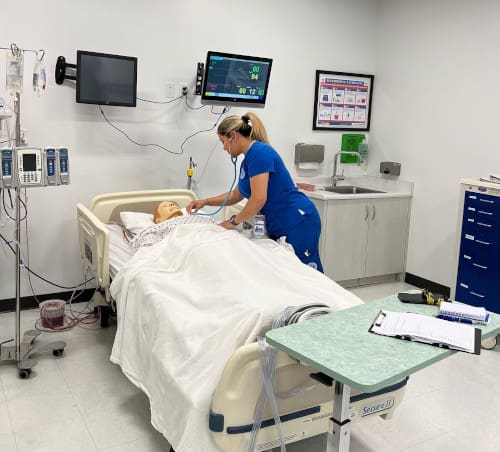
Through these experiences, students work closely with clinical instructors, preceptors, and healthcare staff, gaining valuable insights into interprofessional communication and collaboration. This hands-on approach ensures that our graduates are not only skilled in clinical practices but also deeply understand the importance of providing culturally sensitive care to a diverse patient population, preparing them thoroughly for their future roles in the nursing field.
Practical Opportunities for Students
CNI College’s BSN diploma program offers extensive practical learning through 63 clinical facility partnerships, supporting 40-student cohorts per core term for comprehensive clinical experiences. The Director of Business Development and the nursing clinical manager rigorously assess each facility for resource adequacy, staffing, and student capacity, ensuring high-quality learning environments. The program values student feedback, conducting regular site evaluation surveys and visits by the Clinical Coordinator to maintain stringent standards in currency, accessibility, resources, and patient care quality. Facilities failing to meet criteria are reevaluated or potentially discontinued, maintaining excellence in practical training. The Virtual Resource Room provides a current list of facility agreements, reflecting the program’s commitment to practical opportunities.
Involvement Outside the Classroom
CNI College encourages student engagement outside the classroom, exemplified by its affiliation with the National Student Nurses Association and the establishment of a CNI College California Chapter of the CNSA. Participation in the CNSA chapter provides students with extracurricular activities, leadership opportunities, and influence within and beyond the student body. Our students play key roles at state and national levels, enhancing their appeal to future employers and enabling them to contribute significantly to community service projects. The CNSA Board offers diverse roles, including President, Vice President, Secretary, Treasurer, and directors for various functions, accessible from the fifth term of the nursing curriculum. A CNI College nursing student currently holds the prestigious role of President in the state-wide CNSA organization, demonstrating our students’ active and impactful involvement in the nursing and healthcare communities.
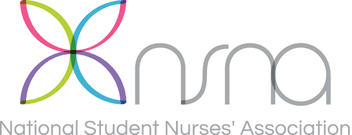

Integrating Advancements into the BSN Program

CNI College’s BSN program incorporates advanced technology and facilities for a realistic nursing education experience. The Nursing Program Learning Center includes simulation rooms, skills labs, and spaces for faculty, with WIFI-enabled classrooms accommodating 45 to 60 students and a fully-equipped science lab. Students receive personal laptops, integrating technology into their studies. The Skills Lab features three rooms with 10 beds and manikins, simulating an acute care setting for hands-on practice, including mid-fidelity simulators for diverse clinical scenarios. Students also get a clinical lab pack with individual equipment. The Simulation Lab offers high-fidelity simulations with advanced simulators like the Laerdal Simman 3G and Gaumard Noelle Maternal and Neonatal Birthing Simulator, complete with audio and video recording for debriefing. An observation room enhances learning through direct observation and audio/video review, fostering an immersive and reflective learning environment.
Support Services for BSN Students

Career Services Department
At CNI College, our Career Services team plays a pivotal role in guiding BSN students and graduates beyond academic learning. They offer personalized career preparation and placement assistance, catering to the unique needs and goals of each student. The focus is not only on securing initial employment but also on encouraging long-term career growth. This team’s dedicated support ensures students are ready for real-world nursing challenges and helps in fostering their professional development.
Student Services Department
The Student Services Department at CNI College is instrumental in supporting the overall well-being and academic success of our students. They offer resources and referrals for personal challenges that may impact academic performance, ensuring comprehensive support for every student. The effectiveness of our support services is reflected in the high completion rates (73% for 2022-2023) and employment rates (79% for 2022-2023) of our RN-BSN program graduates. Career Services maintains a close connection with employers to track graduates’ employment and career advancements, such as promotions post-BSN degree. This holistic approach to student and graduate support highlights our commitment to empowering nursing students to reach their full professional potential.
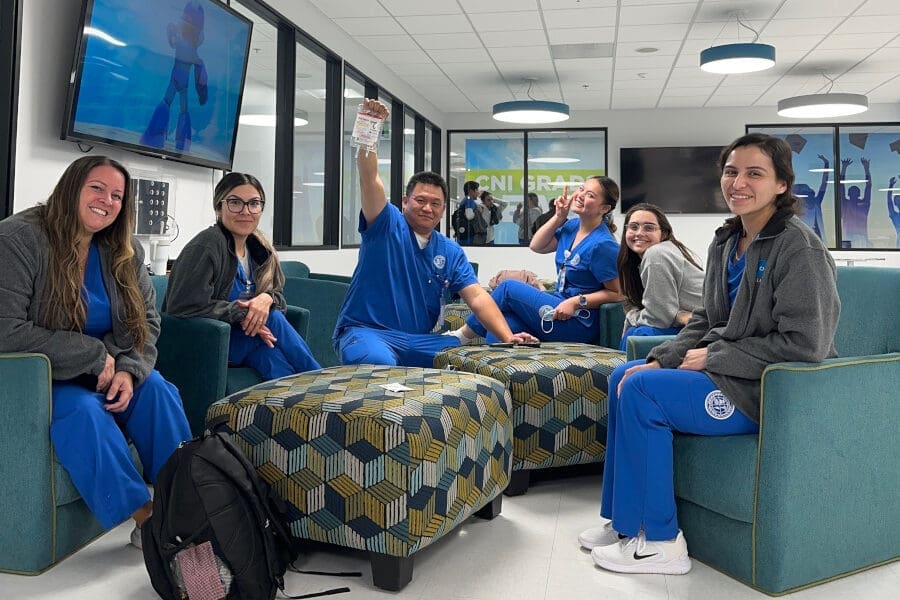
Financial Aid for the BSN Program

At CNI College, we are committed to making quality nursing education accessible and affordable for all aspiring healthcare professionals. From the very outset of the admission process, our financial aid services are designed to support students in navigating the complexities of funding their education. The Financial Aid Department, led by a team of knowledgeable and experienced staff, plays a crucial role in providing comprehensive financial aid counseling. They are well-equipped to inform students about the various criteria and responsibilities associated with financial aid options. Our admissions advisors, responsible for program enrollment, work closely with the financial aid team to ensure that they are consistently trained and updated on the specific requirements and opportunities in the nursing field. This collaborative approach ensures that students receive accurate and relevant information, helping them make informed decisions about their educational investment. Our goal is to ease the financial burden of education, enabling students to focus on their academic and professional development in the pursuit of a career in healthcare.
Accreditation and Licensing

The Baccalaureate Degree Program in Nursing at CNI College is distinguished by its esteemed accreditations and licensing, ensuring the highest standards of nursing education. The program is accredited by the nationally recognized accrediting agency:
Commission on Collegiate Nursing Education (CCNE)
655 K. Street NW, Ste.
750, Washington, DC 20001
Phone: (202) 887-6791
https://www.aacnnursing.org/CCNE
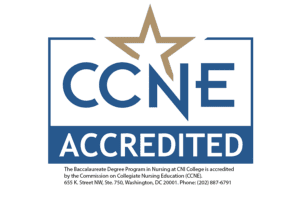
Additionally, the pre-licensure BSN program is fully licensed by:
State of California Board of Registered Nursing (BRN)
1747 North Market Blvd, Suite 150
Sacramento, CA 95834
Mailing address:
P.O. Box 944210
Sacramento, CA 94244-2100
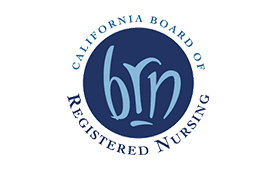
These accreditations and licenses underscore the program’s adherence to rigorous educational standards and commitment to excellence in nursing education.
About the Campus in Orange County


CNI College’s campus in Orange County is a testament to our commitment to superior education, housed in a 52,000 square foot modern building with 20,000 square feet dedicated to the nursing program. This facility includes administrative offices, classrooms, advanced medical and nursing skill labs, high-fidelity simulation areas, a student union, a comprehensive library, and computer labs. It also features spaces for student and faculty lounges, conference rooms, and faculty offices, creating an engaging and supportive learning environment. The evolution of the campus and its resources has been in sync with the development of our programs, from the ASN degree to the current pre-licensure BSN program.
Our clinical training sites have been carefully developed and adapted, especially during challenges like the COVID-19 pandemic, faculty shortages, and facility restrictions. Our faculty have ensured comprehensive and quality clinical experiences, even securing community-based settings for pediatric placements. The CNI College campus, located on the second floor of the Santa Ana building, offers spacious classrooms and faculty offices, along with a student union and lounge areas. These lounges, equipped with vending machines, provide a comfortable space for students to relax and socialize, reflecting our commitment to a clean and respectful environment. In keeping with health and safety standards, smoking is strictly prohibited on the college premises.
Success Stories

“I had a great experience from the beginning to the end”
Prince A. - CNI Graduate
“This is an amazing school. All the staff I spoke to were professional and easy to speak with.”
David B. - CNI Graduate
Admission Requirements for the BSN Program

Admission to the CNI College Bachelor of Science in Nursing (BSN) program is a thorough process designed to ensure that applicants are well-suited for the demands of a nursing career. The key requirements for admission include:
Initial Requirements:
- Completion of a potential student questionnaire form.
- An initial personal interview and campus tour with a CNI College Admissions Advisor. Applicants must be at least 17 years old. Parents and significant others are encouraged to attend.
- A non-refundable application fee of $100 (specific to the BSN program).
Educational Qualifications:
- High school graduation, a GED certificate, or a credentialed foreign degree equivalent to 12th grade proficiency.
Entrance Exam:
- Passing the HESI exam, a national standardized test. Minimum score for the BSN program: 75.0%
- Passing the TEAS VII exam, a national standardized test. Minimum score for the BSN program: 58.0%.
- Applicants who fail the HESI exam can retake it, following specific retesting policies.
Additional Requirements:
- Completion of financial arrangements and, if applicable, financial aid applications.
- Signing of an Enrollment Agreement (by a parent or guardian if under 18).
- Submission of health examination, pathology test, and/or immunization records.
- Full disclosure of any medical conditions that may impact safe program completion.
- Background check clearance prior to clinical practicum or externship (cost borne by the student).
Residency Requirement:
- All program formats (residential, blended, online distance education) are exclusively available to California residents.
This comprehensive set of requirements ensures that students entering the BSN program at CNI College are well-prepared for the challenges and responsibilities of the nursing profession.
